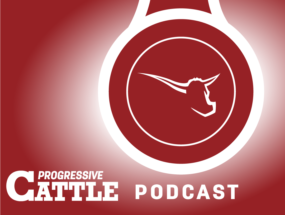There is nothing like a healthy newborn calf to make your day. However, it is important to remember there are several factors that can influence the health and vigor of newborn calves. One of those factors is nutrition of the dam. Proper nutrition prior to calving can greatly impact the developing fetus and colostrum quality.
Body condition score (BCS) of cows at calving has been shown to influence several factors, but a big one is calf health and vigor. First, cows in appropriate body condition (BCS 6) are better equipped to handle the physical demand of parturition. Then, cows with good BCS supply more immunoglobulins in their colostrum, which generally leads to healthier calves and fewer scour issues. From there, they are more likely to meet nutritional demands of lactation, which results in faster breedback in the spring too. Look at cow BCS and provide supplemental feed to bring thin cows up to more ideal scores.
In many Midwest areas, selenium is deficient in the soil. As a result, pasture, hay and grains that are grown from Midwestern soils will share the deficiency. As a herd manager, one option to consider is providing higher levels or more bioavailable sources of selenium in your mineral supplementation program to alleviate deficiency. Injectable products are also available. It is recommended that selenium and vitamin E both be supplemented to guard against selenium deficiency.
Vitamin A and E can have impacts on calf health and vigor. Low vitamin levels can be a lurking culprit in many areas that have experienced drought. While grazing green grass, vitamin A and E needs are met, but if cattle have been drylotted or consuming harvested feeds, then supplemental vitamins may be needed. Cornstalks, Conservation Reserve Program (CRP) hay and holdover hay will most likely be low in vitamin A. Vitamin A also degrades fairly rapidly, so old mineral or old feed may not be supplying the vitamin A that you think it is. Fresh forage, fresh mineral supplement and injectable vitamins can all remedy deficiency.
Avoiding large nutritional insults during gestation is good advice. The beef cow is pretty resilient, but cows that are borderline in BCS or cows experiencing rapid weight loss or nutrient deficiency can lead to loss of pregnancy or negative implications to lifetime performance of the developing fetus. Correct protein, energy, vitamin and mineral levels all play a role in proper nutrition.
Losing a calf can add stress, both mentally and financially, to your operation. Overall, keeping cows in good condition entering calving season and consuming quality nutrients can set the stage for success at calving. Drylotted cows, cows in drought and cows consuming poor-quality feeds may need special intervention to make sure that poor nutrition isn’t stealing calf health and vigor.








